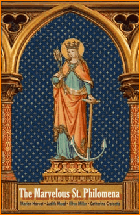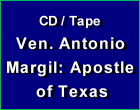Stories & Legends
 |
 |
 |
 |
 |
 |
 |
St. Bernard Converts the Duke of Aquitaine
William, Duke of Aquitaine, was a prince of great wealth, gigantic stature and exceptional ability, who from his youth had been a daring godless man. He could not live without war, and even in times of peace he would make his vassals fight.
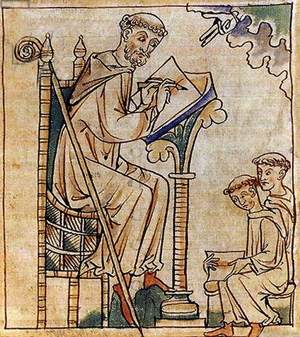 Further, he was head of a party that backed the schismatic Anacletus and refused to acknowledge the legitimate Pontiff Innocent II. Throughout his lands he was persecuting the adherents of the legitimate Pope and had expelled the Bishops of Poitiers and Limoges.
Further, he was head of a party that backed the schismatic Anacletus and refused to acknowledge the legitimate Pontiff Innocent II. Throughout his lands he was persecuting the adherents of the legitimate Pope and had expelled the Bishops of Poitiers and Limoges.
To this man Innocent II sent the servant of God, Bernard, in order to turn him from his sinful ways and bring him back into the bosom of the Church.
St. Bernard, therefore, quitted his Abbey of Clairvaux in the year 1131 and entered the territory of the Duke, taking up his abode at Chatellier in a monastery of his Order. There he wrote a letter to the Duke with the request that he come and visit him.
And so, to the astonishment of all, the powerful Duke arrived, remained seven days with the holy man of God, and returned to his castle with a promise to do penance for his sin. Such was the presence and powerful persuasion of the Saint.
A broken promise
But, hardly had Duke William returned when wicked counselors drew him back to his godless life so that his condition was now worse than before.
St. Bernard was deeply troubled and waited for a fitting time when he might once more attempt the conversion of that sinner.
At length, believing that the moment had arrived, Bernard, accompanied by the Papal Legate, again betook himself to the province of Aquitaine and invited Duke William to a meeting. The Duke, although shaken by the words of the Saint, still refused to be reconciled with the Bishop of Poitiers, whom he had banished from his lands.
Then, St. Bernard had recourse to prayer, resolving that God alone should work in this matter.
The power of the Holy Eucharist
On the day, therefore, when the next conference was arranged to take place, the Saint offered Holy Mass while the Duke and other schismatics stood at the door, as they were under excommunication.
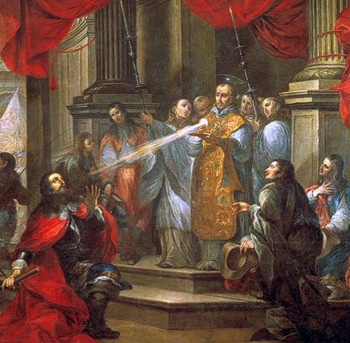 In the midst of the Holy Sacrifice, St. Bernard stopped and, laying the Host upon the paten, with glowing countenance and flashing eyes he descended the steps of the altar, went to the threshold of the Church, and, standing before the Duke, he said:
In the midst of the Holy Sacrifice, St. Bernard stopped and, laying the Host upon the paten, with glowing countenance and flashing eyes he descended the steps of the altar, went to the threshold of the Church, and, standing before the Duke, he said:
“We have wasted prayers enough, and you have despised us. Many of God's servants have united their petitions with ours, and all in vain. Now the Son of the Virgin comes, He whom you persecute, the Master and Lord of the Church, the Judge before whose name every knee in heaven or earth or hell is bowed. Into His hands, the hands of the Avenger of all evil, your soul will fall! Will you despise Him also?”
Then the Saint fell silent. Silence reigned over the praying throng around. With anxiety everyone awaited the conclusion to this unheard-of proceeding, which appeared like a sudden revelation of divine power.
The terrified Duke, a giant of a man, was unable to utter a single word. His knees shook and he sank upon the ground. When his guards raised him up, he fell down again with a frightful cry.
Then did the Saint touch him and bade him by signs to arise. In solemn tones he commanded the Duke:
“Go and reconcile yourself with the Bishop of Poitiers, whom you have banished from his see. Give him the kiss of peace and conduct him yourself to the church. And then show him as much honor as you have done him dishonor. Recall those back to Catholic unity whom discord has separated from the Holy Church, and be obedient to Pope Innocent, whom God has raised to the See of St. Peter.”
The Duke, full of the strength of the Holy Ghost, did all that was commanded of him, and from that moment became a changed man.
William afterwards founded a new Cistercian monastery and went on pilgrimage to Compostella, in the course of which he died.

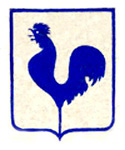

Blessed by God St. Bernard writes to the Duke
To this man Innocent II sent the servant of God, Bernard, in order to turn him from his sinful ways and bring him back into the bosom of the Church.
St. Bernard, therefore, quitted his Abbey of Clairvaux in the year 1131 and entered the territory of the Duke, taking up his abode at Chatellier in a monastery of his Order. There he wrote a letter to the Duke with the request that he come and visit him.
And so, to the astonishment of all, the powerful Duke arrived, remained seven days with the holy man of God, and returned to his castle with a promise to do penance for his sin. Such was the presence and powerful persuasion of the Saint.
A broken promise
But, hardly had Duke William returned when wicked counselors drew him back to his godless life so that his condition was now worse than before.
St. Bernard was deeply troubled and waited for a fitting time when he might once more attempt the conversion of that sinner.
At length, believing that the moment had arrived, Bernard, accompanied by the Papal Legate, again betook himself to the province of Aquitaine and invited Duke William to a meeting. The Duke, although shaken by the words of the Saint, still refused to be reconciled with the Bishop of Poitiers, whom he had banished from his lands.
Then, St. Bernard had recourse to prayer, resolving that God alone should work in this matter.
The power of the Holy Eucharist
On the day, therefore, when the next conference was arranged to take place, the Saint offered Holy Mass while the Duke and other schismatics stood at the door, as they were under excommunication.

The impious Duke William is subgugated by St. Bernard and the Holy Eucharist
“We have wasted prayers enough, and you have despised us. Many of God's servants have united their petitions with ours, and all in vain. Now the Son of the Virgin comes, He whom you persecute, the Master and Lord of the Church, the Judge before whose name every knee in heaven or earth or hell is bowed. Into His hands, the hands of the Avenger of all evil, your soul will fall! Will you despise Him also?”
Then the Saint fell silent. Silence reigned over the praying throng around. With anxiety everyone awaited the conclusion to this unheard-of proceeding, which appeared like a sudden revelation of divine power.
The terrified Duke, a giant of a man, was unable to utter a single word. His knees shook and he sank upon the ground. When his guards raised him up, he fell down again with a frightful cry.
Then did the Saint touch him and bade him by signs to arise. In solemn tones he commanded the Duke:
“Go and reconcile yourself with the Bishop of Poitiers, whom you have banished from his see. Give him the kiss of peace and conduct him yourself to the church. And then show him as much honor as you have done him dishonor. Recall those back to Catholic unity whom discord has separated from the Holy Church, and be obedient to Pope Innocent, whom God has raised to the See of St. Peter.”
The Duke, full of the strength of the Holy Ghost, did all that was commanded of him, and from that moment became a changed man.
William afterwards founded a new Cistercian monastery and went on pilgrimage to Compostella, in the course of which he died.

(Adapted from Emily Mary Shapcote, Legends of the Blessed Sacrament
London: Burns and Oates, 1877, pp. 28-29)
Posted June 6, 2015
London: Burns and Oates, 1877, pp. 28-29)
Posted June 6, 2015





